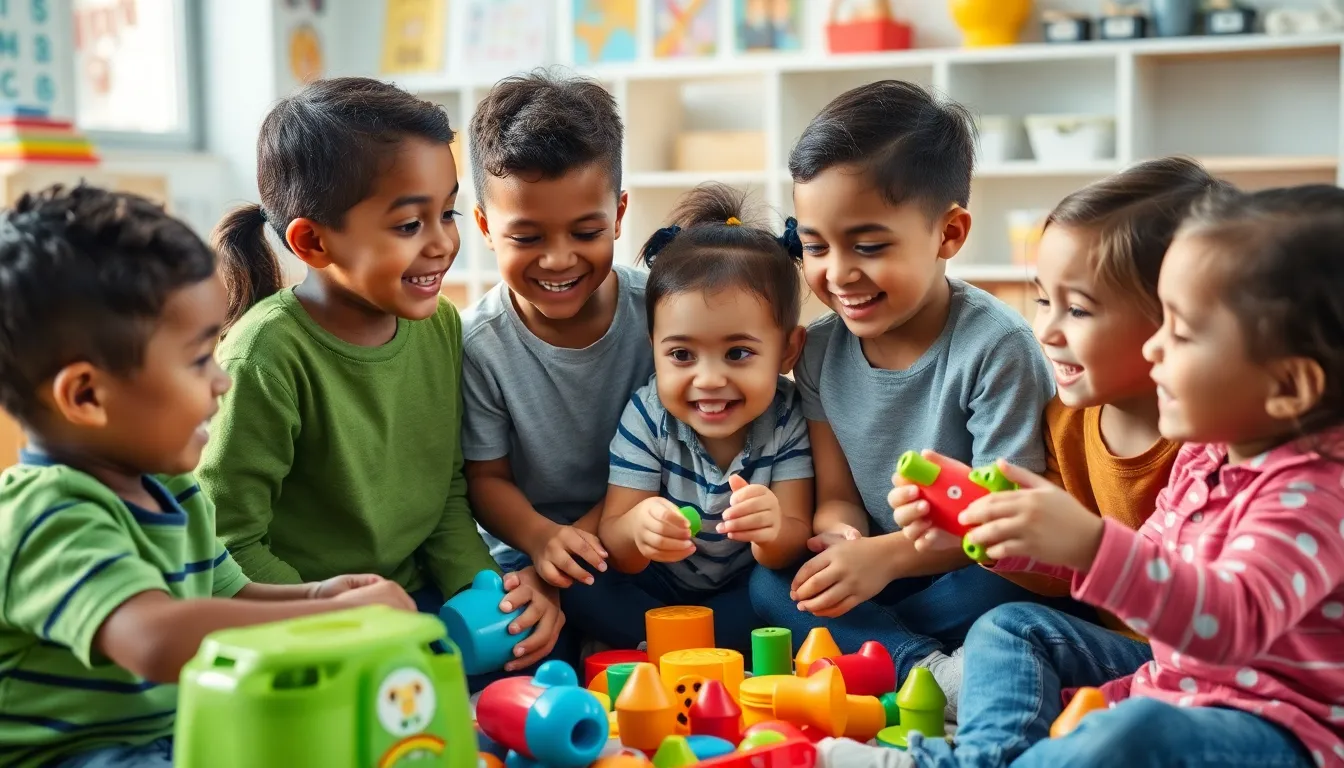Table of Contents
TogglePreschool isn’t just a place for kids to play with blocks and finger paint; it’s a magical realm where tiny minds embark on their first educational adventure. Imagine a world where learning happens through laughter, creativity, and the occasional glitter explosion. In this vibrant environment, children discover the joy of sharing, the thrill of counting, and the art of storytelling—all while mastering the fine skill of not eating the crayons.
Importance Of Preschool Education
Preschool education serves as a foundational experience that shapes a child’s future learning. Young children develop essential social skills through interactions with peers and teachers. Key concepts like counting and letter recognition start to take root, building a base for academic success.
Hands-on activities enhance creativity and critical thinking, allowing children to explore their interests. Engaging in structured play helps youngsters learn cooperation and communication. Emotional intelligence grows as they navigate relationships and express feelings in a safe environment.
Research has shown that children who attend preschool are better prepared for kindergarten. They often show increased curiosity and a love for learning in later years. Skills acquired during preschool set the stage for lifelong development and academic achievement.
Developmentally appropriate practices in preschool classrooms ensure that lessons align with children’s needs. Trained educators guide students through experiences that foster both individual growth and group participation. This balanced approach encourages confidence and independence as children tackle new challenges.
Preschool education plays a crucial role in laying the groundwork for future success. Social, emotional, and academic skills cultivated in these early years significantly impact children’s overall development. Prioritizing quality preschool programs helps ensure every child has the opportunity to thrive in their educational journey.
Key Skills Developed In Preschool

Children in preschool engage in various activities that enhance their development. They cultivate essential skills that form the foundation for future learning.
Social Skills
Social skills grow significantly in preschool. Children learn to share toys, take turns, and cooperate on group projects. Through interactions with peers, they navigate friendships and practice effective communication. Engaging in structured play activities fosters teamwork and develops conflict-resolution strategies. Furthermore, kids gain empathy as they understand others’ feelings. Research shows that strong social skills contribute to better relationships and success in later educational settings.
Emotional Development
Emotional development thrives in preschool. Children begin to recognize and express their own feelings effectively. They learn to manage emotions, like frustration or excitement, through guided activities. In a safe environment, kids develop resilience as they encounter challenges and setbacks. Preschool also encourages self-regulation practices, helping children understand the importance of waiting and patience. Strong emotional foundations help foster confidence and create a secure base for future learning.
Cognitive Abilities
Cognitive abilities expand through diverse experiences in preschool. Kids explore numbers, shapes, and basic problem-solving skills. Interactive lessons emphasize critical thinking, encouraging inquiry and curiosity. Engaging with stories promotes language development and comprehension skills. Activities like counting games enhance numerical understanding while hands-on projects foster creativity. Enhancements in cognitive abilities prepare children for more complex tasks in later education.
Learning through Play
Preschool fosters learning through engaging play experiences. Varied activities stimulate children’s development while they enjoy interacting with peers and materials.
Structured Activities
Structured activities provide a framework for learning essential skills. Teachers guide children through projects that encourage teamwork and focus. During these sessions, kids explore colors, shapes, and simple math concepts. This approach helps them develop literacy skills through storytelling and letter recognition. Engaging in music or movement activities enhances motor skills and coordination. Additionally, teachers use these activities to model behavior, fostering cooperation and sharing among children.
Free Play
Free play offers children the freedom to explore and express their creativity. It allows kids to create their own rules and scenarios during playtime. Interactions with peers develop critical social skills, such as negotiation and conflict resolution. In these unstructured settings, children learn to use their imagination and problem-solve independently. For instance, they may invent games, build structures, or role-play various characters. This kind of play nurtures emotional intelligence by helping kids understand their feelings and those of others. Overall, free play complements structured activities, promoting a well-rounded preschool experience.
Curriculum Highlights
Preschool curriculum encompasses diverse areas that support holistic development. Throughout their time in preschool, children engage in various activities that prepare them for future academic success.
Language and Literacy
Language and literacy development takes center stage in preschool education. Children begin by recognizing letters, sounds, and simple words. Storytime fosters comprehension, encouraging kids to predict narratives and understand plot structure. Vocabulary expansion occurs through conversations and songs, enhancing expressive language skills. Additionally, children practice writing with playful activities, such as tracing and crafting letters. As they explore books, they discover the joys of reading, developing a lifelong love for literature.
Math and Science Concepts
Math and science concepts form another critical component of preschool learning. Counting games introduce numbers, laying a foundation for basic arithmetic. Sorting and categorizing objects enhances cognitive skills and fosters early problem-solving abilities. Exploring nature through hands-on experiments helps children understand scientific principles. Simple science observations encourage curiosity about the world around them. Engaging in these activities prepares young learners for more advanced mathematical and scientific concepts in later grades.
Arts and Creativity
Arts and creativity play a fundamental role in preschool education. Through painting, drawing, and crafting, children express their thoughts and feelings. Creative expression promotes critical thinking and innovative problem-solving skills. Participating in music and movement activities fosters an appreciation for rhythm and melody. Imaginative play stimulates children’s creativity, allowing them to explore various roles and scenarios. By nurturing artistic abilities, preschool helps build confidence and encourages self-expression.
Preschool is a crucial stepping stone in a child’s educational journey. It lays the groundwork for future learning by fostering essential skills and nurturing creativity. Through engaging activities and guided play, children develop social interactions and emotional intelligence that are vital for their growth.
The diverse curriculum not only introduces foundational concepts but also encourages a love for learning that lasts a lifetime. As children embrace new challenges and experiences, they build confidence and resilience. Investing in quality preschool education ultimately shapes well-rounded individuals ready to thrive in their academic pursuits and beyond.





